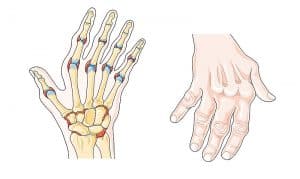Collagen is an important and most abundant protein found in the human body. Usually present in skin, muscles, bones, and tendons, collagen is responsible for providing your skin a better shape. It also helps prevent bone loss and support heart health. Collagen has gotten a lot of attention in recent years because of its use in nutritional supplements. A few studies performed on collagen has shown the importance of this protein and how it has a variety of health benefits such as:
- Increases muscle mass
- Improves your skin health
- Relieves joint pain
- Helps with heart health
- Reduces wrinkles
Benefits of Collagen for Your Body
It’s found in your bones, tendons, skins, and muscles. The main function of collagen is to hold your body together by giving it the necessary strength and structure. As a major component of connective tissues, collagen is made naturally by your body. Some of the main benefits of collagen are:
- Promote hair health
- Improve skin texture
- Strengthen bone and nail health
- Minimize skin wrinkles
- Stimulate amino acid production
- Help build muscles
- Aid in burning fats
- Provide support to joints
These are just a few main benefits of this amazing protein. To get these benefits, you need to eat foods that are rich in collagen. You can also get yourself collagen nutritional supplements found in the market.
Foods that are Rich in Collagen
While there are many collagen supplements out there, you can eat food rich in vitamins and proteins to help your body produce collagen naturally:
- Carrots
- Leafy green vegetables
- Garlic
- Soy
- Egg
- Avocados
- Salmon
These foods contain:
Proline – which is found in dairy products, mushrooms, cabbage, and egg whites. Proline is one of the main components in the synthesis of collagen.
Copper – Copper content is found in sesame seeds, cashews, lentils, and cocoa powder.
Vitamin C – which can be found in citrus fruits, broccoli, tomatoes, and spinach.
Glycine – It’s found in garlic, spinach, broad beans, and broccoli. It’s also one of the main components of collagen production.
When proline combines with glycine in the presence of vitamin C, your body produces collagen. In short, healthy, nutrient rich, and low calorie foods are high in essential nutrients and protein, which are required for synthesizing collagen.
How Collagens are Destroyed
Collagen has a very useful functioning in your body. However, overtime food and lifestyle choices greatly affect the amount of collagen your body makes. Below are a few foods that can reduce and destroy collagen content in your body.
Smoking – those who smoke most often tend to have very less amount of collagen. Smoking also stops your body from getting essential protein and amino acids. As a result, you’re deprived of certain useful nutrients.
Carbs and sugar – People who consume more sugar have a faulty system that interferes with the ability of collagen substance to heal itself. This results in less production of collagen.
Ultraviolet rays – While basking in the sun is a good idea, however, too much of it can reduce the production of collagen.
Collagen Supplements
There are more than a dozen different types of collagen. Classified into types such as type I, II, and III, collagen can also be obtained from supplements. While your body is responsible for generating collagen, these nutritional supplements can be a quick source of this amazing protein.
Most collagen supplements are made by mixing different types of collagen together. However, there are also other forms of collagen. Main of them are:
Gelatin – Collagens in this form are broken down into amino acids.
Raw – You can find collagen in a raw, indentured form. In this form, the protein remains in place.
Hydrolyzed collagen – this type of collagen can be broken down into amino acids.
You can take collagen supplements without any problem. However, using natural foods to obtain collagen is more effective than supplements, etc.
How Much Collagen Dosage Should You Consume?
If you’re interested in using collagen supplements, there are certain recommended dosages based on the available research.
Bone health – Collagen supplements specifically for bone health should be taken in a limited amount. When sourced from cows, a 5 grams hydrolyzed collagen can help increase bone density.
Skin health – For skin health, you can use 2.5 grams of hydrolyzed collagen. Research has shown that mixing type I, II, and III has shown to improve skin health after a period of two to three months.
Muscle building – If you’re into building muscles, using 15 grams of collagen supplement within 1 hour after your training can help with building muscles.
In short, collagen supplements can be used without any prescription as they are generally considered safe. However, there may also be some side effects of using collagen supplements. Because these supplements are mostly sourced from animals, that’s why it may not be suitable for those looking into vegan options.

Conclusion
Collagen plays an important role in building and structuring of your skin, improving nails, fingers, and hair health. It can also help build muscles, burn fats, and provide joints support. With these amazing health benefits and useful functions in your body, collagen is undoubtedly one of the most essential proteins for your health. Your body uses proline and glycine in the presence of vitamin C to produce collagen. Therefore you should eat food rich in vitamins and proteins. If you’re interested in taking collagen supplements instead, try sticking to a recommended dosage for maximum benefit.


